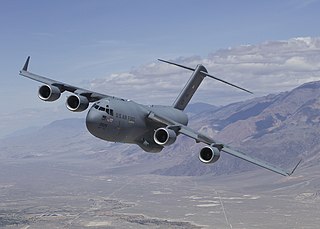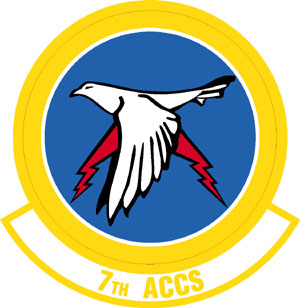
The McDonnell Douglas/Boeing C-17 Globemaster III is a large military transport aircraft that was developed for the United States Air Force (USAF) from the 1980s to the early 1990s by McDonnell Douglas. The C-17 carries forward the name of two previous piston-engined military cargo aircraft, the Douglas C-74 Globemaster and the Douglas C-124 Globemaster II.

The Boeing YAL-1 Airborne Laser Testbed weapons system was a megawatt-class chemical oxygen iodine laser (COIL) mounted inside a modified military Boeing 747-400F. It was primarily designed as a missile defense system to destroy tactical ballistic missiles (TBMs) while in boost phase. The aircraft was designated YAL-1A in 2004 by the U.S. Department of Defense.

The 16th Airlift Squadron is an active unit of the United States Air Force, assigned to the 437th Airlift Wing, Air Mobility Command. It is based at Joint Base Charleston, South Carolina. The squadron operates Boeing C-17 Globemaster III aircraft supporting the United States Air Force global reach mission worldwide.
An airborne laser (ABL) is a laser system operated from a flying platform, as in the:

The 412th Test Wing is a wing of the United States Air Force, assigned to the Air Force Test Center at Edwards Air Force Base, California.

The 97th Airlift Squadron is a United States Air Force Reserve squadron, assigned to the 446th Operations Group, stationed at Joint Base Lewis-McChord, Washington. It is a USAF Associate Unit of the active duty 4th Airlift Squadron, 62d Airlift Wing.

The 7th Expeditionary Airborne Command and Control Squadron is part of the 379th Air Expeditionary Wing at Al Udeid Air Base, Qatar. It operates the E-8 Joint STARS aircraft, conducting airborne command and control missions. The squadron has performed the airborne command and control mission since 1968, when it was activated in Vietnam. In 1985, the squadron was consolidated with three earlier units: The 7th Ferrying Squadron, which helped deliver aircraft to the Soviet Union from 1942 until 1944; the 7th Combat Cargo Squadron, which performed combat airlift missions in the Southwest Pacific Theater from 1944 until V-J Day, then became part of the Occupation Forces in Japan until inactivating in 1948; and the 7th Air Transport Squadron, Special, which provided airlift support for the United States' special weapons program from 1954 to 1966.

The 31st Combat Training Squadron is an active United States Air Force unit. It is currently assigned to the Nevada Test and Training Range at Nellis Air Force Base, Nevada.

The 415th Flight Test Flight is a United States Air Force reserve unit. It is assigned to the 413th Flight Test Group of Air Force Reserve Command, stationed at Joint Base San Antonio-Randolph, Texas.

The 416th Flight Test Squadron is a United States Air Force squadron. It is assigned to the 412th Operations Group, Air Force Materiel Command at Edwards Air Force Base, California. The 416th performs flight testing on General Dynamics F-16 Fighting Falcon aircraft.

The 418th Flight Test Squadron is a United States Air Force squadron. It is assigned to the 412th Operations Group, Air Force Materiel Command, stationed at Edwards Air Force Base, California.

The 419th Flight Test Squadron is a United States Air Force squadron. It is assigned to the 412th Operations Group, Air Force Materiel Command, stationed at Edwards Air Force Base, California.

The 445th Test Squadron is a United States Air Force squadron. It is assigned to the 412th Operations Group at Edwards Air Force Base, California. The 445th is part of the Air Force Test Center. Originally constituted in 1943 as the 445th Fighter Squadron, it was involved in the early testing of the first U.S. jets, the Bell P-59 Airacomet and later the Lockheed P-80 Shooting Star. The squadron would also be involved in flight-testing captured enemy aircraft, such as the Mitsubishi A6M Zero. During the Cold War, the unit served under the Air Defense Command as the 445th Fighter-Interceptor Squadron, flying various interceptor aircraft in defense of the Continental United States. De-activated in 1968 following a draw-down of active duty interceptor units, it was re-activated as the 6512th Test Squadron Squadron in 1969, beginning its official flight-testing mission. The unit was de-activated, re-activated, and re-designated multiple times over its life, being most recently re-activated with its current name in 2022.

The 452d Flight Test Squadron is a United States Air Force squadron. It is assigned to the 412th Operations Group, Air Force Materiel Command, stationed at Edwards Air Force Base, California.

The 461st Flight Test Squadron is a United States Air Force squadron, assigned to the 412th Operations Group of Air Force Materiel Command, and is stationed at Edwards Air Force Base, California. The Squadron performs flight testing on the Lockheed Martin F-35 Lightning II.

The 29th Training Systems Squadron is an active United States Air Force unit. It is assigned to the 753d Test and Evaluation Group, at Eglin Air Force Base, Florida.

The 57th Weapons Squadron is a United States Air Force unit. It is assigned to the USAF Weapons School, stationed at the McChord AFB component of Joint Base Lewis-McChord, Washington. The squadron is a geographically separated unit of the 57th Wing at Nellis Air Force Base, Nevada. The mission of the squadron is to provide Boeing C-17 Globemaster III instructional flying.

The Boeing Phantom Eye was a high altitude, long endurance (HALE) liquid hydrogen-powered unmanned aerial vehicle developed by Boeing Phantom Works. The aircraft was Boeing's proposal to meet the demand from the US military for unmanned drones designed to provide advanced intelligence and reconnaissance work, driven by the combat conditions in Afghanistan in particular. In August 2016, the Phantom Eye demonstrator was disassembled for display at the Air Force Flight Test Museum.

The 816th Expeditionary Airlift Squadron was a provisional United States Air Force unit. It is assigned to the 385th Air Expeditionary Group, stationed at Al Udeid Air Base, Doha, Qatar. It was last engaged in combat operations in Southwest Asia.

The 915th Tactical Fighter Group is an inactive United States Air Force Reserve unit. It was last active with the Tenth Air Force, based at Homestead Air Force Base, Florida. It was inactivated on 1 April 1981.























